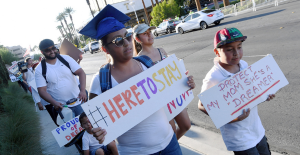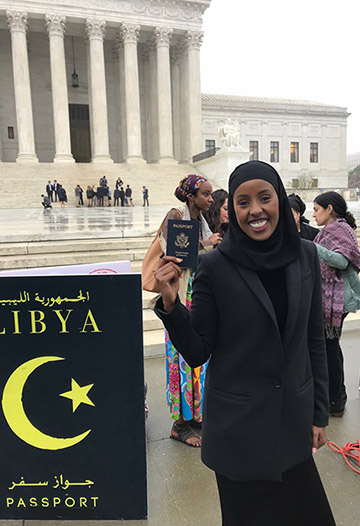THE TORCH: CONTENTSBy Ignacia Rodriguez, NILC immigration policy advocate
JUNE 14, 2018
Earlier this year, on February 15, the U.S. Senate debated and voted on immigration-related bills and amendments, all aimed at solving the crisis created by President Trump’s decision to terminate the DACA (Deferred Action for Childhood Arrivals) program. However, the Senate ended up not approving any of the proposals or bills. Of the four amendments they voted on, one that mirrored President Trump’s proposal received the least support, with only 39 votes. The bipartisan USA Act, sponsored by Senators John McCain (R-AZ) and Christopher Coons (D-DE), which included a pathway to U.S. citizenship for immigrant youth as well as immigration enforcement–related provisions, garnered majority support but fell shy of the 60 votes needed to proceed.
Over the past few weeks, there has been a lot of buzz about a discharge petition that, if it had received enough signatures, would possibly have forced a vote on the “Queen of the Hill” resolution, which would bring four immigration measures to a vote in the U.S. House of Representatives. However, the discharge petition fell shy of receiving enough signatures this week. Now attention is focusing on the proposed Securing America’s Future Act of 2018 (also known as the “Goodlatte bill,” after its sponsor, Rep. Bob Goodlatte, R-VA) and a “compromise bill” that mirrors the White House anti-immigrant wish list, which could be brought up for a vote next week.
As these developments unfold, it’s important to pause, reflect on, and take some lessons from what’s taken place in Congress over the past few months with regard to immigration legislation. And we need to continue emphasizing the need for our Republican and Democratic legislators to enact a narrowly tailored solution that will provide permanent immigration relief to our DACA-eligible neighbors and friends.
What are some of the elements that any truly effective DACA solution should contain? In other words, what questions should we be asking when evaluating the legislative proposals we’ve seen thus far or any new proposals that may be offered?
First, does the proposal provide a path to citizenship? Early on, the BRIDGE Act was introduced to provide a path by which certain immigrant young people would be able to legalize their immigration status, but it did not include a path to U.S. citizenship. Essentially, it would have placed the DACA program into the immigration statute, making it a law rather than an administrative policy. Although various bills introduced after the BRIDGE Act included provisions for permanent relief (including the ultimate possibility of U.S. citizenship), the Goodlatte bill would instead take several steps backwards. For example, it proposes that immigrant youth become a completely new category of immigrants, to be known as “contingent nonimmigrants,” and that they receive authorization to live and work in the U.S. for a three-year period that could be renewable but would include no path to citizenship.
Immigrant youth deserve permanent immigration relief that provides a path to U.S. citizenship, with all the rights citizens have; anything less would be relegating those who are granted the proposed new status to a permanent second-class existence in this their de facto home country. Any bill that simply makes the current DACA program permanent by codifying it — making it part of the immigration statute — would create a situation in which people with DACA would have to periodically and continually renew it, perhaps for the rest of their lives. Immigrant youth, like everyone else, need and deserve long-term stability.
Second, if the proposal provides a path to U.S. citizenship, is it a reasonable one? What are its requirements? How long would the person have to wait before being eligible to apply for citizenship? The longer the wait, the more insecurity people will feel about applying, since the program they’re counting on could conceivably be rescinded by Congress. Even if such a development is unlikely, remember that immigrant youth have experienced the ups and downs of having the government make DACA available and then take it away. So any lack of trust they have in the government is well-earned by the latter; going forward, they need a secure and reliable path that they can count on.
Third, is the path to citizenship fair? For example, minimum and maximum age requirements should be evaluated critically. An amendment (No. 1958) to the Immigration Security and Opportunity Act, introduced by Senators Rounds (R-SD), King (I-ME), and Collins (R-ME), includes an age cap of 38; and an amendment (No. 1959) to the Secure and Succeed Act, introduced by Sen. Grassley (R-IA), includes an age cap of 31 — i.e., to be eligible to apply for the immigration benefit, a person must have not been older than either age 38 or 31, respectively, on June 15, 2012, the date when the DACA program was announced. Sen. Grassley’s amendment also provides that, to be eligible, the immigrant must have arrived in the U.S. by the age of 16 (rather than 18), thus excluding many minors from a program intended to provide relief for immigrant youth. If someone meets every other requirement to qualify for relief, why should they be excluded for the one thing they have no control over: their age when they arrived in the U.S. and/or their age on June 15, 2012?
Fourth, what’s the real cost of applying? For example, under Sen. Grassley’s amendment to the Secure and Succeed Act, an applicant who is 18 or over would have to “sign, under penalty of perjury, an acknowledgement confirming that the alien was notified and understands that he or she will be ineligible for any form of relief or immigration benefit … other than withholding of removal … or relief from removal based on a claim under the Convention Against Torture” if they violate any ground of eligibility for conditional temporary resident status. In other words, in exchange for receiving relief, which could be taken away, they would have to waive the ability to seek most other forms of immigration relief in the future.
The grounds of eligibility for conditional temporary resident status under the bill include ones the U.S. Department of Homeland Security has the authority to alter and redefine. For example, one such ground is that an applicant is not likely to become a “public charge” — and for months it’s been known that the Trump administration is in the process of expanding the criteria for finding that a noncitizen is or is likely to become a public charge (see, for example, NILC’s issue brief Changes to “Public Charge” Instructions in the U.S. State Department’s Manual).
And under the Rounds-King-Collins amendment, a person granted relief under the Immigration Security and Opportunity Act would not be allowed to sponsor their parents for immigration relief if the parents knowingly assisted the person in entering the U.S. unlawfully. Many young immigrants would feel severely conflicted about applying for much-needed immigration relief through a process that criminalizes and punishes their parents. Applying for immigration relief should not put immigrant youth or their families at risk in the future.
Fifth, does the proposed DACA fix include other unacceptable trade-offs? Immigrant youth have made it clear that they won’t allow their lives and futures to be used as bargaining chips so the Trump administration and Trump’s allies in Congress can further a harmful and racist anti-immigrant agenda. Thus, any DACA fix that isn’t narrowly tailored should be evaluated carefully and critically. Legislative proposals including a DACA fix have included at least some of the following proposed provisions:
- Permanent changes to family immigration sponsorship — for example, no longer allowing any citizen to sponsor their adult child for immigration relief.
- An end to the Diversity Visa Program, which would predominantly affect migration from Africa and Asia.
- More funding and intrusive technology for border enforcement.
- Attacks on policies adopted by states, cities, and localities intended to build trust between all residents (including immigrants) and local authorities.
Therefore, it’s critically important to carefully read and evaluate any proposed bill. The public messaging about a bill may be focused on “protecting DACA and immigrant youth,” but we must look at the entire bill and understand any potential harm it may have on immigrant communities and broader communities of color. It’s usually the case that, until you read a bill section by section, you can’t really tell what its real purpose is, regardless of its title.








